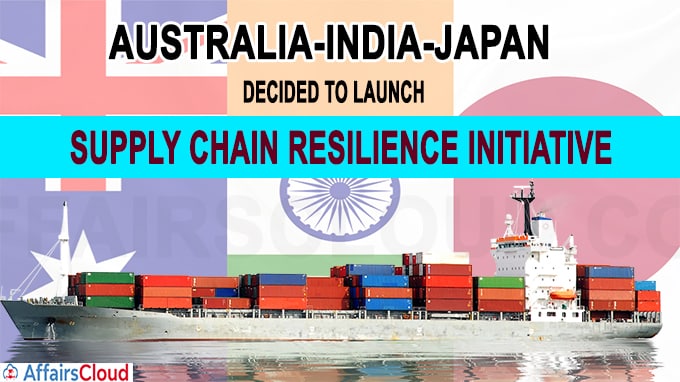 On September 1, 2020 India, Japan and Australia agreed to launch a trilateral Supply Chain Resilience Initiative (SCRI) in the Indo-Pacific region. The initiative will help in building a resilient supply chain with focus on free, transparent trade & investment environment in the region.
On September 1, 2020 India, Japan and Australia agreed to launch a trilateral Supply Chain Resilience Initiative (SCRI) in the Indo-Pacific region. The initiative will help in building a resilient supply chain with focus on free, transparent trade & investment environment in the region.
The initiative was decided at a virtual meeting comprising Australia’s Minister for Trade, Tourism and Investment, Senator Simon Birmingham, India’s Minister of Commerce and Industry Piyush Goyal, and Japan’s Minister of Economy, Trade and Industry, Kajiyama Hiroshi.
Key Points:
i.The initiative was proposed by Japan and will aim to reduce the dependency on China and counter its dominance on trade.
ii.The new initiative will be launched later in 2020 and officials will work out the details of the project.
iii.The Three countries called on other countries in the region to share their view and participate in the initiative.
iv.Australia, Japan and India are already part of another informal grouping, the Quadrilateral Security Dialogue which includes the U.S.
Supply Chain Resilience:
i.In International Trade, Supply Chain Resilience is an approach which will ensure that the supply chain of a country is diversified and is not dependent on one or two countries.
ii.The approach will be essential during unanticipated events such as tsunamis, earthquakes and pandemic, ensuring that there is no disruption or halt in trade which will impact the economic activity in the country.
Economic Dependence on China:
All the three countries are heavily dependent on China for its supply chains.
i.Japan has exported $135 billion worth goods to China in 2019 and imported $169 billion worth from China.
ii.China is Australia’s largest trading partner and accounts for 32.6% of Australia’s exports.
iii.According to an impact analysis by Confederation of Indian Industry (CII) in February 2020, India is heavily dependent on China for Active Pharmaceutical Ingredients for medicines such as paracetamol. In electronics, China accounts for 45% of India’s imports.




